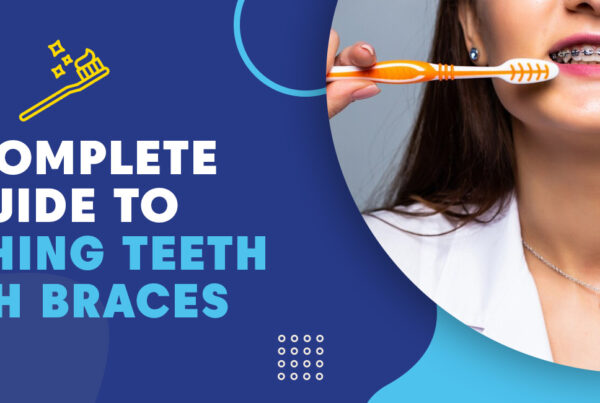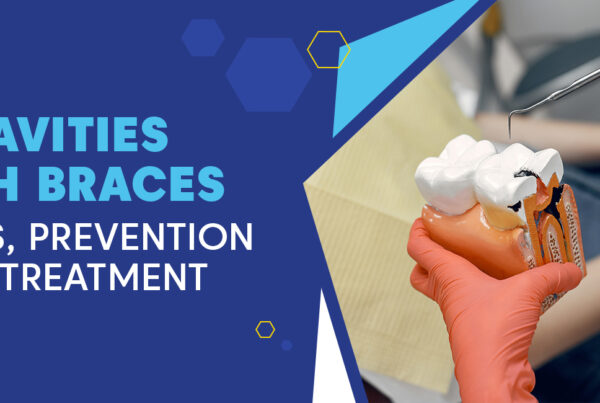- What Does A Broken Bracket Look Like?
- Causes Of Broken Bracket and Braces
- Is A Broken Bracket Painful?
- How To Deal With A Broken Bracket?
- How Long Is It Okay To Have A Broken Bracket?
- How To Fix A Broken Bracket?
- How To Prevent Broken Brackets?
- How To Safeguard Your Mouth When Brackets Break
- Consult Orthodontic Experts for Broken Braces and Brackets
Are you tired of dealing with broken braces and brackets? It can be frustrating when brackets disrupt your orthodontic progress. But don’t worry! In this guide, we will walk you through everything you need to know about broken braces brackets. From understanding the causes to learning how to handle emergencies, we’ll provide you with all the information you need to ensure a smooth orthodontic journey. Let’s dive in!
What Does A Broken Bracket Look Like?
When a bracket is broken, it won’t stay attached to your tooth, and it might move, spin around, or slide along the archwire.
If a bracket attached to the posterior teeth is broken, it might slide off the archwire and end up in the back of your mouth. But don’t worry! If this happens, just take the bracket out of your mouth. If you accidentally swallow it, don’t be worried!
Causes Of Broken Bracket and Braces
When you have braces, it’s common for the brackets to break. Knowing why it happens can help you prevent damage. Here are some reasons for broken braces brackets:
- Chewing Hard or Sticky Foods: Brackets are strong, but biting hard foods like popcorn kernels or chewing sticky things like caramel can make them crack or come off.
- Not Maintaining Good Oral Hygiene: If you don’t brush and floss properly, plaque can build up around the brackets. This can weaken the bond between the brackets and your teeth, making them more likely to break.
- Accidental Hits: Accidents, like falls or sports injuries, can cause brackets to break. Wearing a mouthguard during risky activities helps protect both your teeth and braces.
- Incorrect Bracket Placement: Sometimes, brackets may not be put on correctly during orthodontic treatment. If they’re not aligned right or the adhesive isn’t applied well, it can make the brackets less stable and more likely to break.
- Bruxism: Grinding or clenching your teeth (bruxism) can put too much pressure on the brackets, wearing them down or causing them to break. If you think you grind your teeth, talk to your orthodontist for advice on protecting your braces.
Is A Broken Bracket Painful?

When a bracket in your braces is broken, it usually doesn’t hurt a lot, but it can be uncomfortable. The bracket might move on the wire, and that can be annoying. Sometimes, a broken bracket can even create cuts or sores inside your mouth, making it painful. If the broken bracket exposes the end of the wire, it might poke your cheek or gum, causing more discomfort and irritation.
How To Deal With A Broken Bracket?
Dealing with a broken bracket on your braces may seem tricky, but don’t worry – we’ve got you covered with these simple steps:
- Check the Damage: When a bracket breaks, check if it caused any harm to other brackets linked by the wire. If multiple brackets are loose, secure them in a container.
- Relieve Irritation: If wires are bent or poking, use wire cutters or nail clippers to trim them. Tuck away any loose wire using a Q-tip or bend it around another secure bracket. Use sugar-free gum or orthodontic wax to ease pain by covering the wire.
- Schedule an Appointment: Book an appointment with your orthodontist as you can’t reattach brackets on your own. Prompt bracket fixing minimizes discomfort and prevents teeth from shifting back.
- Maintain Oral Hygiene: Keep your mouth clean to avoid infections before the appointment. Gargle with warm salt water or use antiseptic rinses to cleanse wounds.
How Long Is It Okay To Have A Broken Bracket?
If your bracket is broken but doesn’t bother you, there’s no rush to fix it. You can wait a few days or even weeks without it affecting your treatment. In the meantime, use wax or sugar-free gum to ease any discomfort until your scheduled appointment.

However, if it’s causing discomfort or you’re worried, it’s a good idea to contact your orthodontist. They usually have specific times for bracket repairs and can schedule your appointment in a few days.
How To Fix A Broken Bracket?
Fixing broken brackets isn’t an emergency but you’ll have to go to the orthodontic office. The whole repair takes around 5-10 minutes. Here’s what happens:
- The bracket is taken off the archwire.
- The bracket is cleaned.
- The tooth surface is polished, and any leftover bracket adhesive is removed.
- The tooth is prepared for orthodontic bonding.
- The bracket is attached to the tooth.
- Reactivation of the archwire
How To Prevent Broken Brackets?
When you have braces, it’s really important to keep your brackets safe to avoid any problems. Here are some simple tips to help you prevent your braces brackets from breaking:

- Brush your teeth well after every meal and floss every day. This helps remove any food bits stuck in your braces.
- Stay away from hard or sticky foods like popcorn, hard candies, caramel, and chewy gum. Choose softer foods and cut them into smaller pieces.
- Use a mouthguard during activities: If you play sports or do physical activities, wear a mouthguard to shield your braces from accidents and impacts.
- Braces can be delicate, so don’t chew on hard things like pens, pencils, or nails.
- Keep up with your orthodontic appointments to make sure your braces are working well. Your orthodontist can catch any bracket issues early and fix them.
- Don’t touch or play with the brackets, as it could move or damage them.
How To Safeguard Your Mouth When Brackets Break
People with broken braces and brackets may experience mouth ulcers or cuts. While sores in the mouth heal quickly, continuous irritation from braces can prolong the healing process. New braces and those with broken wires or brackets tend to cause the most irritation on the inside of the cheeks.
To reduce discomfort, a small amount of dental wax can be applied to form a barrier between the metal bracket and the mouth. Saltwater rinses are also effective in soothing and aiding the healing of sores by maintaining cleanliness.
Additionally, using an antiseptic rinse designed for oral care or numbing creams may be helpful. Maintaining good oral hygiene is essential, especially when dealing with cuts or sores in the mouth.
Consult Orthodontic Experts for Broken Braces and Brackets
Having a broken bracket can be a pain! But don’t worry, Orthodontic Experts are here to help. Our experienced orthodontists can fix your braces quickly and easily. We have multiple locations in Illinois, Wisconsin, and Indiana, so you’re sure to find one near you. So if you have a broken bracket, don’t wait, call Orthodontic Experts today!










